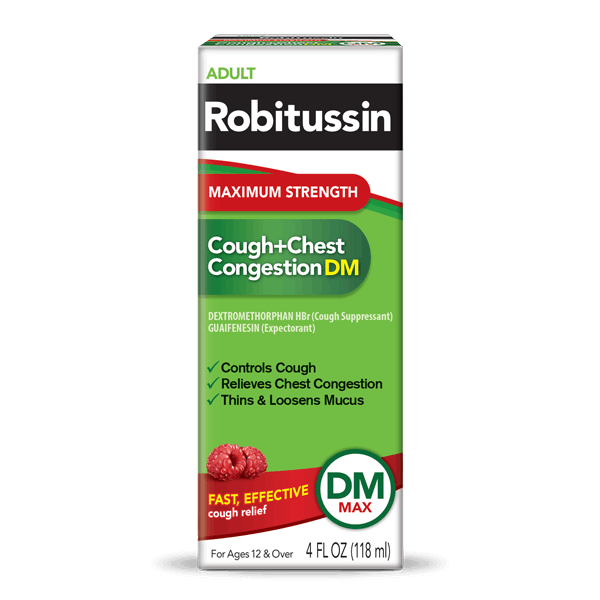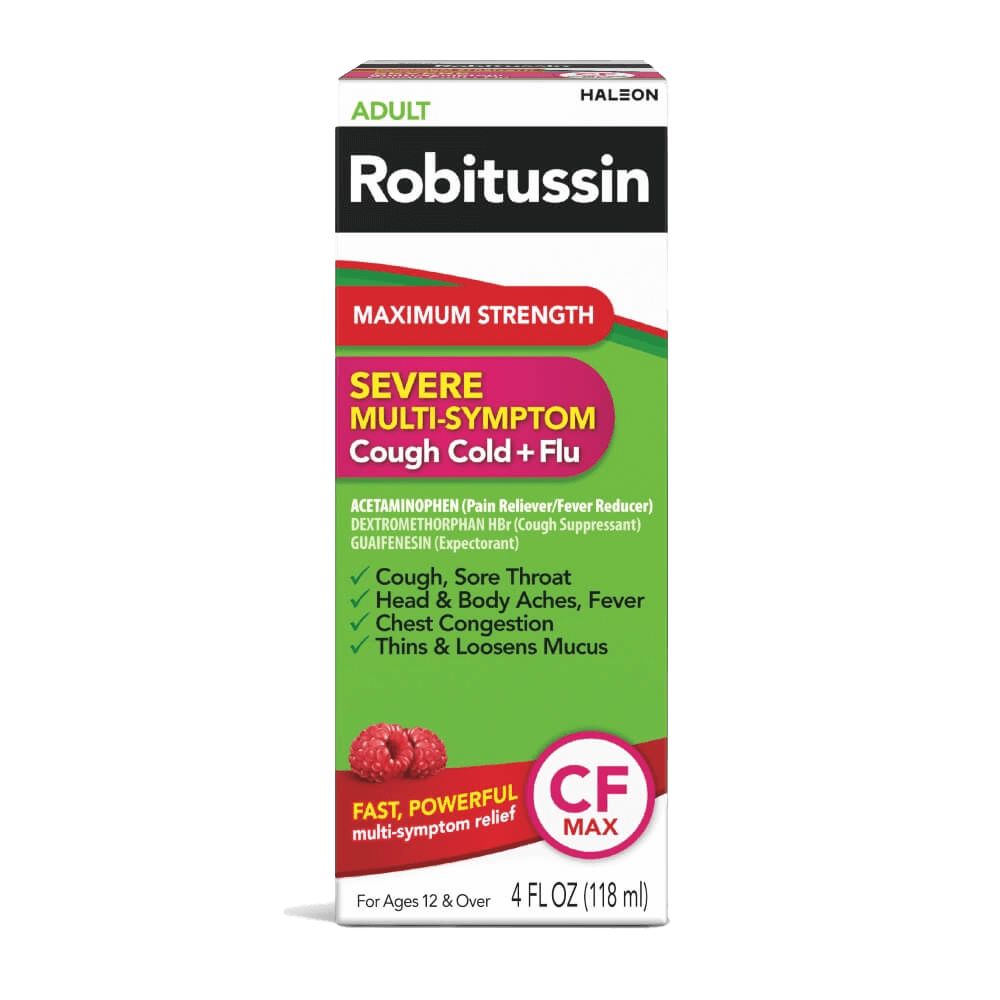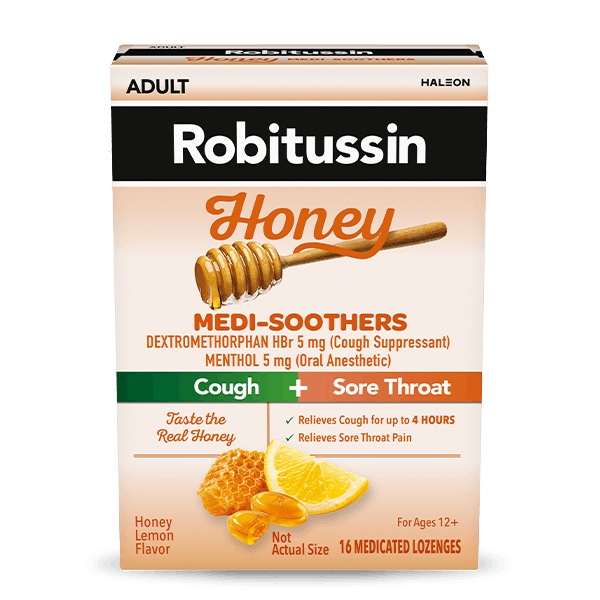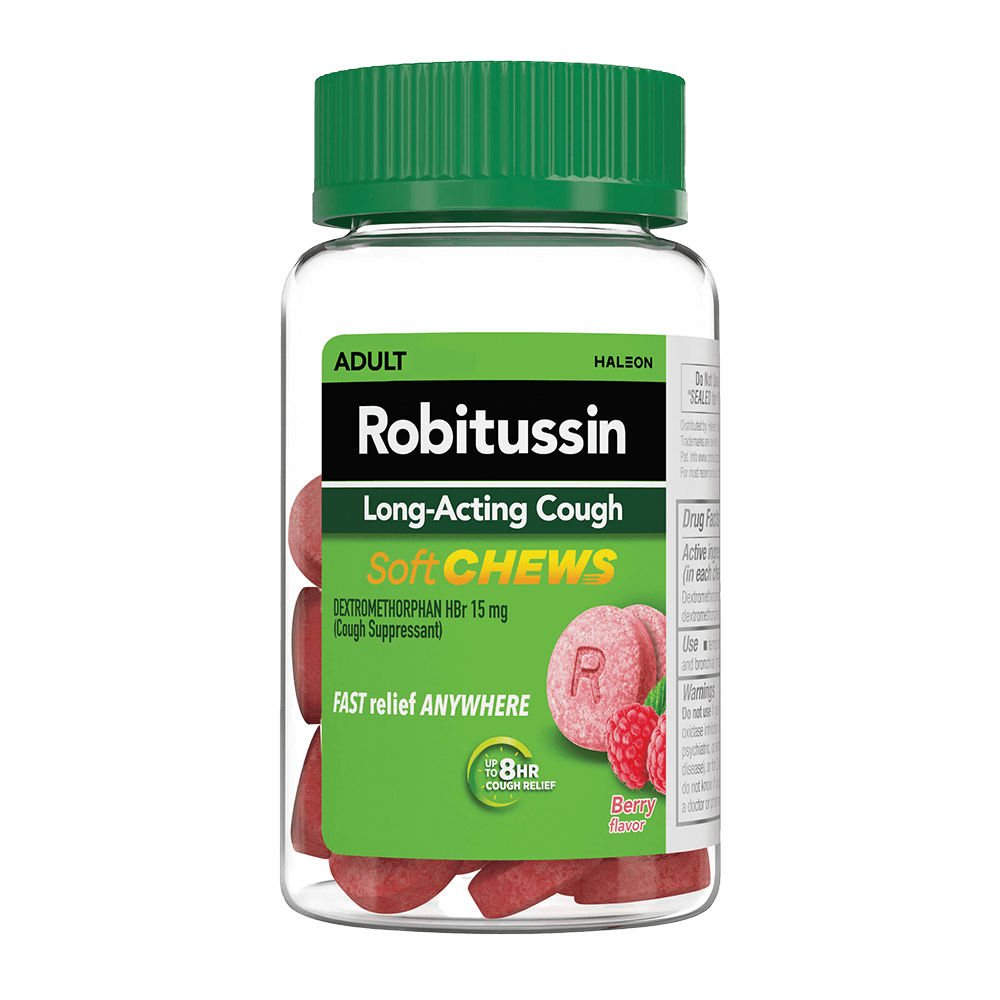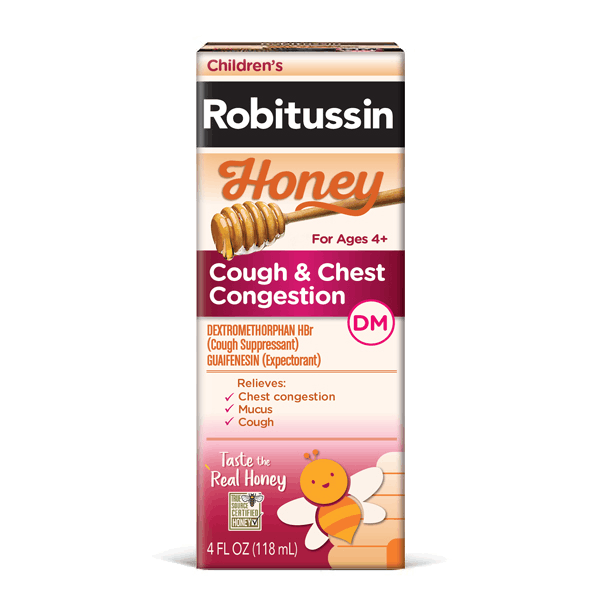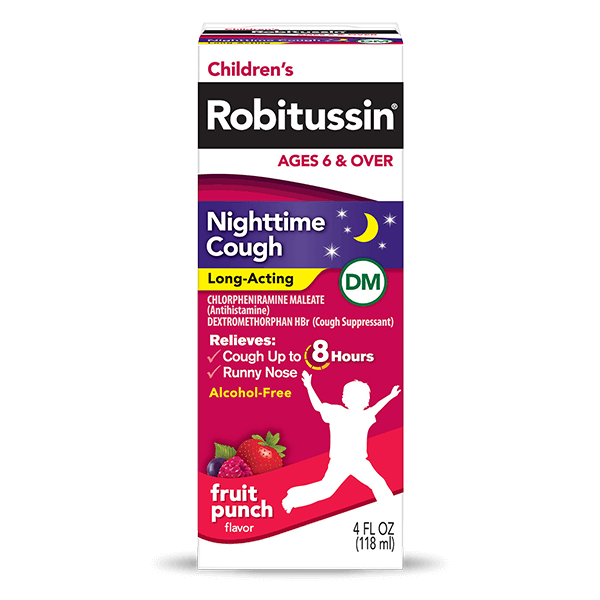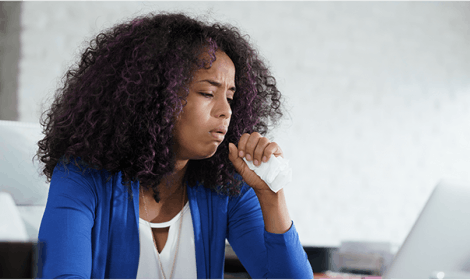Understand How Dextromethorphan Medicine Helps Coughs
How Does Dextromethorphan Cough Medicine Work?
Dextromethorphan is categorized as a cough suppressant or antitussive medication. Antitussives are effective because they influence receptors in the brain that help control coughing.1 By influencing your brain receptors, it reduces activity in the cough center of your brain, decreasing cough frequency and strength.1,2
Dextromethorphan is a common ingredient in cough medicines including Robitussin. To soothe your cough symptoms for up to 4 hours, try Robitussin Elderberry Medi-Soothers to receive soothing relief from your cough, thanks to menthol and dextromethorphan in every lozenge.
How Do You Take Dextromethorphan?
You can find dextromethorphan in various cough medicine forms like syrups, tablets, liquids, capsules and solutions.1,2 While each dextromethorphan product contains the same medication, the form of the medicine can affect how quickly the drug is absorbed and how long it stays in your system.3 As a result, the drug’s effects can vary based on its inactive ingredients and form. Drug manufacturers aim to optimize both absorption and bioavailability—ensuring that a drug reaches its target site quickly and in effective amounts.
Dextromethorphan Cough Medicine Dosages
Dosages depend on the age group. Dosages for adults and children are listed below:
- Adult dosage: Adults and adolescents over the age of 12 are recommended to have 10-20 milligrams every 4 hours as needed.4
- Pediatric dosage: Children aged 6 to 12 are recommended to have a maximum dose of 10 mg every 4-6 hours. Children 4 to under 6 years of age are recommended to have a maximum dose of 5mg every 4 hours. Children under the age of 4 should not use dextromethorphan.4
Dextromethorphan may also be used in combination with other medicines to tackle various cold and flu symptoms together.1 However, to avoid drug interactions and overlapping treatments, consider a multisymptom product that addresses cough and other common cold and flu symptoms in one. Consult a healthcare provider if you're taking multiple medications.
Dextromethorphan’s Clinical Efficacy and Safety Profile
Dextromethorphan's effectiveness and safety have been well-studied when it comes to treating a cough.5 However, understanding the risk-benefit profile is important in using dextromethorphan products safely.
Potential Side Effects of Using Dextromethorphan
Dextromethorphan is safe when used as directed to treat a cough; however, there are potential side effects individuals should be aware of.5 Common side effects may include:1
- Dizziness
- Nausea
- Vomiting
- Stomach pain
- Light-headedness
- Drowsiness
- Nervousness
- Restlessness
Precautions for Optimal Use
To use dextromethorphan safely and effectively, remember these tips:6
- Follow dosing instructions: Follow the dosing instructions carefully, and don't take more than directed by your healthcare provider. Exceeding the recommended dosage may cause side effects or adverse reactions.
- Exercise caution combining with other medications: Be cautious when combining with other substances and consult a healthcare provider if you're taking multiple medications. Depending on your medication, you doctor may change your dosage, how often you use medication, or not recommend dextromethorphan.
- Don’t consume alcohol: While using dextromethorphan, don’t consume alcohol. Alcohol may intensify side effects and impair your judgement.
- Monitoring medical conditions: Different respiratory disorders, autoimmune disorders, and diseases can cause additional side effects. Consult with your healthcare provider before using dextromethorphan.
Medical problems that can affect dextromethorphan usage
Medical problems that may affect dextromethorphan usage include the following:
- Chronic bronchitis, emphysema, mucus, or phlegm with cough: Bronchitis, emphysema, and phlegm with cough can cause mucus to collect in your lungs and airways. Dextromethorphan decreases coughing, which can inhibit mucus removal.1,3
- Diabetes: Products containing dextromethorphan can contain sugar and affect the results of blood glucose monitoring.7
- Liver Disease: Liver disease may cause dextromethorphan to build in the body and cause adverse effects.7,3
- Asthma: Dextromethorphan decreases coughing, making it harder to get rid of mucus that collects in the lungs and airways due to asthma.1,3
It's important to talk to a healthcare provider before using dextromethorphan, especially if you have underlying medical conditions or are taking multiple medications. This ensures that the benefits of dextromethorphan are maximized while minimizing potential risks.1
By understanding how dextromethorphan works and considering its various forms and precautions, you can use it responsibly and effectively for cough relief. For other ways to find relief from cough, congestion, colds, and more, visit our Cough and Cold Center.
Robitussin Products with Dextromethorphan
Looking for soothing cough relief? Explore Robitussin’s dextromethorphan products here:
- Soft Chew Long Acting Cough
- Soft Chews Nighttime Cough DM
- Maximum Strength Elderberry Cough + Chest Congestion DM
- Maximum Strength Cough and Chest Congestion DM
- Maximum Strength Nighttime Cough DM
- Maximum Strength DM Day/Night Pack
- Maximum Strength Cough and Chest Congestion DM Capsules
- Cough and Chest Congestion DM
- Maximum Strength Nighttime Cough DM
- Maximum Strength DM Day/Night Pack
- Maximum Strength Cough and Chest Congestion DM Capsules
- Cough and Chest Congestion DM
- Elderberry Medi-Soothers
- Maximum Strength Severe Multi-Symptom Cough Cold + Flu
- Long-Acting CoughGels
Find the best Robitussin product for your needs with our Product Finder.
Robitussin Products with Dextromethorphan and Honey
Shop Robitussin’s dextromethorphan and honey products for maximum relief:
- Maximum Strength Honey Cough and Chest Congestion DM*
- Honey Nighttime Cough DM*
- Honey Medi-Soothers
- Severe Cough, Flu, and Sore Throat Relief + Honey*
- Strength Honey Severe Nighttime Cough, Flu + Sore Throat*
*This product contains grade A True Source Certified Honey that’s ethically and transparently sourced. Learn more about True Source Honey.
Source Citations:
- Dextromethorphan. Medline Plus. https://medlineplus.gov/druginfo/meds/a682492.html. Accessed 11/03/2023.
- Dextromethorphan (Oral Route). Mayo Clinic. https://www.mayoclinic.org/drugs-supplements/cough-and-cold-combinations-oral-route/description/drg-20061164. Accessed 11/03/2023.
- Drug Absorption – Drugs. Merck Manual Consumer Version. https://www.merckmanuals.com/home/drugs/administration-and-kinetics-of-drugs/drug-absorption. Accessed 8/20/24.
- ROBITUSSIN® CHEST CONGESTION. NIH. https://dailymed.nlm.nih.gov/dailymed/fda/fdaDrugXsl.cfm?setid=94455035-2482-4b27-8870-45b9b7335696&type=display. Accessed 8/20/24.
- Dextromethorphan Solution (Robitussin): Cough Suppressant. Cleveland Clinic. https://my.clevelandclinic.org/health/drugs/20631-dextromethorphan-solution. Accessed 8/20/24.
- Cough And Cold Combinations (Oral Route) Before Using. Mayo Clinic. https://www.mayoclinic.org/drugs-supplements/cough-and-cold-combinations-oral-route/before-using/drg-20061164. Accessed 8/20/24.
- Dextromethorphan Guaifenesin. StatPearls. NCBI Bookshelf. https://www.ncbi.nlm.nih.gov/books/NBK604212/. Accessed 8/20/24.
- Honey: An effective cough remedy? Mayo Clinic. https://www.mayoclinic.org/symptoms/cough/expert-answers/honey/faq-20058031. Accessed 9/17/24.
